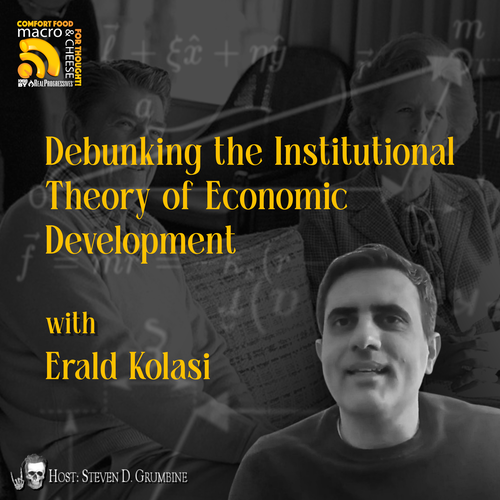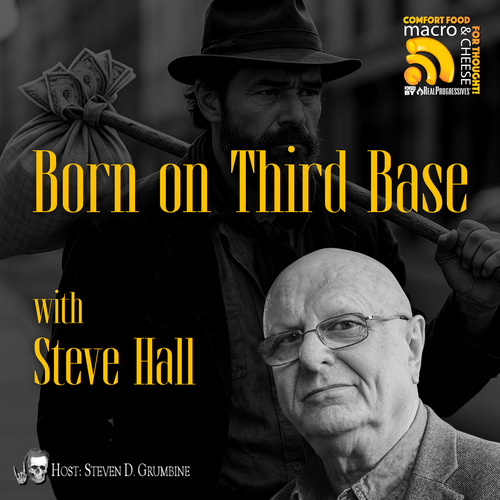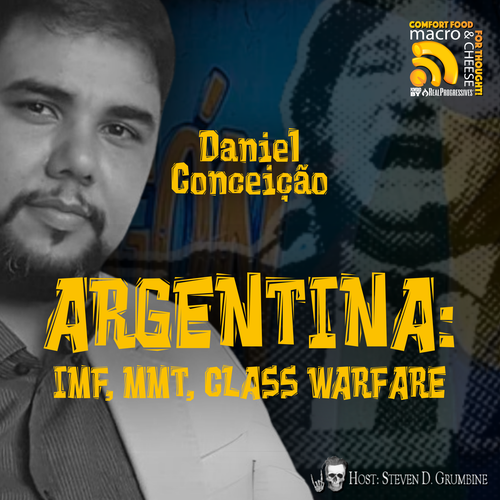Episode 235 – Imperialism and the Global South’s Debt with Ndongo Samba Sylla
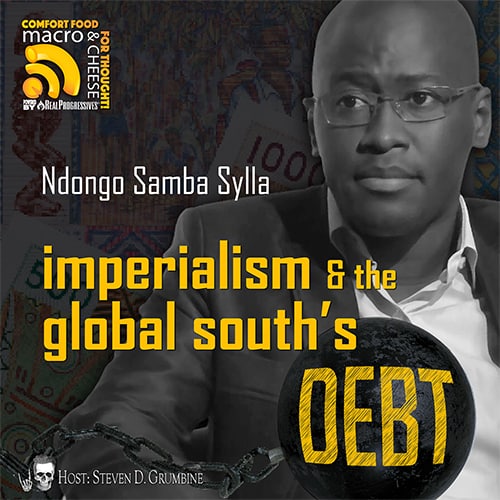
FOLLOW THE SHOW
Steve talks with Ndongo Samba Sylla, Senegalese development economist & program manager of the Rosa Luxemburg Foundation, West Africa office. They discuss austerity and the debt trap faced throughout the Global South.
It will come as no surprise to our listeners that countries of the Global South are mired in a foreign debt crisis and that default is directly tied to the lack of monetary sovereignty.
Our friend Ndongo Samba Sylla, a Senegalese development economist, talks to Steve about the situation, how it came to be, and how it can be overcome.
Countries of the Global South usually are tied to debt in a foreign currency for a number of reasons, including balance of payment constraints and the capture of export income by transnational corporations. Some debt was carried over from colonial rule. Ndongo emphasizes that these countries are often trapped in an extractive economic model. Their resources are exploited by foreign companies, leading to a cycle of debt and dependence.
Debt cancellation, while absolutely necessary, is not enough to address the structural issues that perpetuate the crisis. Ndongo mentions ecological debt — the extraction and exploitation of natural resources from the Global South by the Global North. He highlights the need for a fundamental change in the domestic economic model of accumulation to eliminate the role of debt as an instrument of domination.
Ndongo also traces the history of structural adjustments after attempts at reform in the 1970s, beginning with the proposal for a New International Economic Order (NIEO) that challenged the imperialist system. The austerity we witness today arose from the reaction to that agenda.
Ndongo Samba Sylla is a Senegalese development economist. He has previously worked as a technical advisor at the Presidency of the Republic of Senegal, and is Programme Manager at the West Africa office of the Rosa Luxemburg Foundation. He is the co-author of Africa’s Last Colonial Currency: The CFA Franc Story and author of The Fair Trade Scandal.
@nssylla on Twitter
Macro N Cheese – Episode 235
Imperialism & the Global South’s Debt with Ndongo Samba Sylla
July 29, 2023
[00:00:00] Ndongo Samba Sylla [Intro/Music]: Just for the year 2015, the physical drain from the global south to the global north was 10.8 trillion US dollar, and in the research they show that this amount was 70 times the amount needed to put an end to extreme poverty
for me. Debt cancellation is needed, but it’s just a relief because it’s not a solution to global south’s debt problem because global south’s debt problem is structural in nature.
[00:01:35] Geoff Ginter [Intro/Music]: Now, let’s see if we can avoid the apocalypse altogether. Here’s another episode of Macro N Cheese with your host, Steve Grumbine.
[00:01:43] Steve Grumbine: All right, this is Steve with Macro N Cheese. Today’s guest is none other than my friend Ndongo Samba Sylla. He is a Senegalese development economist. He is currently a senior research and program manager at the West Africa office of the Rosa Luxembourg Foundation in Dakar. He has authored The Fair Trade Scandal: Marketing Poverty to Benefit the Rich, Pluto Press and Ohio University press in 2014. And co-authored Africa’s Last Colonial Currency: The CFA Franc Story, Pluto Press in 2021. He is a co-editor of the Economic and Monetary Sovereignty for the 21st Century Africa, Pluto Press 2021, and of Revolutionary Movements in Africa: an Untold Story, Pluto Press 2023. He’s the editor of Imperialism and the Political Economy of the Global South’s Debt, Emerald 2023, and his tweet handle is nssylla. Without further ado, let’s welcome on my guest. Welcome Ndongo. Thank you so much for joining me today, sir.
[00:02:56] Ndongo Samba Sylla: Thank you Steve for the invitation. It’s great to be here, to have the opportunity to exchange with you.
[00:03:02] Grumbine: Absolutely. The last time I had you on, it was you and Fadhel, and we talked about the spectrum of monetary sovereignty. Today we’re gonna delve into a chapter of a book that you were a part of Discussing Imperialism and the Global South’s Debt: Insights From Modern Monetary Theory, Ecological Economics, and Dependency Theory.
And I’d like you to start off with explaining what the story’s all about. What are we dealing with here?
[00:03:32] Samba Sylla: There are a number of interesting facts when we talk about global south debt. The first one is, for example, that most of the countries that have defaulted on their sovereign debts, in fact, generally speaking, their debt to GDP ratio are lower than the debt to GDP ratio, let’s say, of OECD countries, the global north countries, the richest countries.
For example, you could see countries like Argentina, you see Ecuador or Zambia or Ghana, they defaulted on their sovereign debts at the point when they had debt to GDP ratio lower than countries like, for example, Germany. Like for example, the US or Japan. So this is really an interesting thing in the sense that the most in countries are not those countries that default on their debts, while you see countries, for example, like global south ones that might default at very lower levels of debt to GDP ratio. So you have to understand that. And one way to understand it is to use Modern Money Theory. And when you use Modern Money Theory, you understand that well.
Countries that are monetarily sovereign, that means countries that issue their own national currency, have their own national central bank. Countries that impose liabilities on their own unit of account, countries that do not promise to “peg” their currency, to convert their currency. And countries that do not issue debts, sovereign governments that do not issue debt in foreign currency. Those are monetarily sovereign governments, and for those governments, the size of the debt might not be a problem because those countries cannot be insolvent, you see. While for countries that are less monetarily sovereign or countries that issue debt in foreign currency, they might have a solvency problem.
There is a solvency risk, and that’s the main explanation why, for example, you could see that Japan had 260% of debt to GDP ratio in 2020 and did not default on it’s debt. While countries having something like 50% of debt to GDP ratio, they defaulted on their debts. So that is an issue of monetary sovereignty. So the first explanation is that countries that are in default, governments that are in default, are governments that lack monetary sovereignty.
Now, once you say that, the issue is why these countries need to issue debt in foreign currency. Because if they do not issue debt in foreign currency, maybe they would not have been insolvent in foreign currency. And when you ask that question, it’s not a trivial question because any MMT economist would ask this question first, even if he doesn’t know the context of the country.
He would ask why Ghana needs to issue debt in foreign currency or why Zambia needs issue debt in foreign currency. And when you look at literature, it is really interesting because you have a number of explanations. They’re not entirely convincing, usually speaking.
When you start with mainstream economics, they have something called original sin. And original sin means for them, the lack of capacity from, let’s say, global south countries to issue debt that would be accepted, let’s say by foreign investors. Or there’s what they call also the domestic component of original sin, meaning that these countries could not borrow a loan in their domestic currencies.
And when you look at that literature, they say, we don’t have any explanation of that. We have done many empirical studies and the only thing we found is that they take, like this, large countries are less sinful, you know. Their way of putting, to say that, we have seen that empirically speaking, the biggest countries, they don’t have no problems, no original sin. But at the same time they have found that small countries, to some extent, like Switzerland, they do not face no original sin.
That means that you cannot rely on mainstream economics to understand this question, why these countries need to issue debt in foreign currency. Now you have a second explanation that is valid to some extent, is the explanation based on this legal category of all odious debts. Odious debts means that. there have been some creditors who extended loans to governments, knowing that these loans would be used, not for public purpose, but for illegitimate purposes.
And this is called odious debts, and this is a valid explanation of why some countries issued debt in foreign currency, because in the case of countries like Haiti and also the Democratic Republic of Congo, you see that these countries imposed odious debt at the time of their independence, saying that if you do not pay the debt contracted by the previous colonial administrations, well the US military will be there, or the Belgian military will be there, et cetera, to make sure that you’ll pay the debt. And these countries have been in a vicious debt trap since then.
You could see that this is a valid explanation of why some countries still continue to issue debt in foreign currency. But now you have also other explanations in the economic literature. One of them is the argument that, these countries, they lack savings, and as they lack savings, that means they don’t have the money or the finance, so they have to borrow it abroad.
This has been the standard assumption behind the development community, international development community since its beginning after the second World War, let’s say 1945, et cetera. So you have this idea that developing countries are poor, and so they don’t have the money, so they have to find it abroad.
They have to find it by attracting capital, coming from the global north, or having to sell things in order to bring the needed savings. This betrays a lack of understanding of what is money. Because if you understand,modern money theory, it says that well countries could not be insolvent in their own currency.
That means that everything you could do, you could afford. So the idea that these countries lack savings, is not an explanation at all. And the thing is, it’s investment that creates savings, not the other way around. This also something known by, let’s say, heterodox economists. So this is not a valid explanation at all, saying that they lack savings and that’s why they would issued debt in foreign currency. That’s not a valid explanation. Now, you have a more sophisticated form of explanation given by heterodox economist. For example, there is a strand of the Post-Keynesian literature talking about lack of foreign exchange, talking about balance of payment constraints, et cetera.
This seems a solid argument saying that these countries, as they develop, they need to import things. They need to import technologies, et cetera. These are things that they need for their own development. But the thing is, they don’t have enough US dollars or enough Euros to buy all these stuffs, so that means that their governments need to issue debt in foreign currency.
But you see, this is not a convincing explanation to me. Why? Because you could not talk about a lack of foreign exchange if you do not prescribe what kind of technological choice you are doing, what kind of real resources you plan to use. Because let’s say for example, in my country, Senegal, we want to build schools so that every child could have access to public schooling, et cetera.
If we take the decision to base our project to build schools on, let’s say technologies coming from the US or Japan, surely we will need some foreign exchange and probably the government will have to be in debt in foreign currency. But if we use technologies, real resources that could be developed locally or that we already have, we need not issue debt in foreign currency.
So that means that for the project you could do yourself, I call them local resource project, that means project requiring domestic resources. For that you need not issue debt in foreign currency to implement them. So that means that whenever people talk about lack of foreign exchange, they have to make sure that they are really specific on the kind of real resources that will be used, because it’s not necessary that every time countries rely on foreign real resources.
The second limitation of this lack of foreign exchange view is that, generally most of the countries, especially African countries, they’re commodity rich. And during periods while there is a boom for their commodities, they receive a lot of export income. But the thing is, their export income is controlled by transnational companies, and the transnational companies take a high share of this export income by many practices. They under declare their export income. They over invoice the imports and there are many accounting tricks and frauds, et cetera. So that at the end, even when there had been a boom in commodity prices, African countries, part of their foreign exchange will be captured, by these transnational corporations, and that’s what I have called the ‘foreign debt investment first claim and right’. Because all these countries, they have access to foreign exchange, but there is a kind of distributive conflict about the use of this external income, who is entitled to what. And there are at least six groups of claimants to these countries’ foreign exchange. You have foreign debt investment, because foreign debt investors, when we talk about foreign debt investment we talk about productive investment, to distinguish that with, let’s say, financial investment. And the foreign debt investment will want to have access to the foreign exchange to allow for the repatriations of dividends of profits and so on.
You have external creditors that will want to have access to this foreign exchange for the repayments of the interest payments of the debts, of the loans they extended. You have private companies, they will want to have access to the foreign exchange to buy the imports they need. The populations, they also want to have access to some critical imports: food, energy, pharmaceuticals, and so on.
You have also the governments, they want to have access to the foreign currency for a number of reasons. They have current spending to make, they have prestige spending to make, they have investment spending to make, et cetera. So the thing is, who is entitled to what? And according to me, a foreign debt investment is the first economic agent to be served.
Why? Because most of the foreign exchange, I mean foreign income, comes from the sales of commodities. And the sales of commodities are organized by transnational companies. So that means they will declare what is the export income, and they will also serve themself before releasing the rest of the foreign exchange to the other economic agents.
And actually, if you look at the numbers, for example, in the case of Africa, you see that during the commodity boom, let’s say between 2005 and 2015. In fact, the absolute amount of profit and dividend repatriations by transnational corporations were higher than the interest payment on external debt, and often higher than the debt service itself.
When I say debt service, it’s the principle based amortization, plus the interest payments. And people, generally, they would just focus on the debts, external debts, but they would not see that, for example, in the case of Africa, Africa has been bled much more by the profit and dividend remittances, by NCES corporations, than by the servicing of the external debt.
And for me, the origins of the external debt have to be seen in this pattern where the foreign exchange of African countries is captured by transnational companies, because all of this foreign exchange that is being, to some extent, captured by the transnational corporations, could have been used for domestic purposes in the sense that, could have been used to import technologies, et cetera, that would increase productive capacities, for example, allowing for food sovereignty, allowing for energy sovereignty, allowing for industrial progress, et cetera.
These amounts are not just available for the domestic economy, and that for me explains why these countries sometimes need to issue debt in foreign currency. And you have very clear examples. For example, in the case of Zambia or Ghana, these two African countries, they defaulted it on their external debts. And when you see the numbers, you realize that during the period 2000 to 2020, for example, in the case of Zambia, the profit and dividend repatriated by transnational corporations were quite higher during this period, than the external debt service. So you could see the powerful role played by transnational corporations.
And when our friends from the, say Post-Keynsian community, they talk about lack of foreign exchange, they do not factor this kind of behavior, this kind of structural realities. So there is not something called lack of foreign exchange. There are generally enough foreign exchange, but it’s badly distributed.
[00:18:17] Grumbine: Thomas Sankara and his famous speech where he basically said, I can choose to feed my people, or I can choose to pay your debt, but if I pay your debt, we die. That’s the essence of it. I’m curious as to why this concept has not been taken to the finish line yet? Why the African nations allow the predatory behavior of these transnational corporations? Why they don’t come together in solidarity? Is there any motion right now to take the power back, to create a unified Africa?
[00:18:59] Samba Sylla: Yeah, this is a very good question. It has been very difficult for people to follow the very powerful intuitions from Thomas Sankara, Burkinabe leader who died. He had his famous speech as you say in1987, and he would say that if we repay the debt, we’ll die, and our creditors, they will not die. But if alone, my country does not pay the debt, the next conference, I will not be here because I will be killed. And he had been killed some months later.
This was not specially linked with debt issue, but with his philosophy and the revolutionary path he wanted for his country and African countries. But the thing is Steve, when people think that there is something called lack of money, it’s really difficult. And most of the policy makers, they still believe that they lack the money and you could only find the money in the West, or in China, et cetera.
So what do they do? They will just say, we have to make sure that foreign investors will invest here because they have the money and we don’t. So what they will do, they will let the foreign investor take their resources. And in fact, the foreign investors, generally, they will be interested in the extractive sectors, because for other most interesting sectors, they would not find enough domestic demand.
So they will just invest in sectors when they could expect higher returns than, for example, the returns they could expect in the global north. So only extractive sector. But the thing is, the extractive sectors, it does not create jobs. It does not create spillovers for the rest of the economy, et cetera.
So at the end, it’s not a good deal. You could have some foreign exchange, et cetera, to repay the debt, but that’s all. You can do nothing with this kind of system, and they have been doing that. And unfortunately, since the 1980s with a neoliberal economic private dominance, they have been only doing that, saying that we have to attract foreign investors, because we don’t have the savings, we don’t have the foreign currency, and we need to be more competitive, et cetera, we need to open our economies, et cetera.
That’s what they have been doing, and when you do that, you will face debt crisis because this is an unsustainable economic model. And that’s why from time to time, especially when there is a tenative decline, I mean when the prices of the commodities decline, you will see that most countries will be in debt distress. Because what happens is the kind of, Minskian dynamic. In the sense that these countries, when they have good economic growth led by the boom in commodity prices, they will say, wow, we have nice growth prospects, so we could issue debt in foreign currency. And creditors, they’ll be happy to say, we are going to lend you the money, because in the global North, especially after 2008 great financial crisis, the returns were really low on bonds, sovereign bonds. So they would say, let’s invest in the global south. We could have something like set percent yield, set percent average return, et cetera. Let’s invest there, you see? And the countries of the global south are happy with that, to say that we’ll invest in infrastructure and so on.
And when the terms of trade decline, when the prices of commodities decline, yeah, you will see that the creditors will say, we don’t want to lend you the money because we are not sure that you could repay the debt. So it’ll be austerity, it’ll be the Intentional Monetary Fund, and so on, you know. All these campaigns for debt cancellation and so on. And it’s not a sustainable model, especially when you take into account the fact that these debts in foreign currency are usually invested in infrastructure. And the thing is, when you invest in infrastructure projects, that could be a nice thing, et cetera. You know, it’s infrastructure project for elites like airports, et cetera, some tools, et cetera, for elites. But the thing is, even if these infrastructure projects are highly profitable, generally, in fact, they generate domestic income.
You could not expect to repay your debt in US dollars or in Euros, using, your own domestic income. That means you have to find the foreign exchange for that. And it’s not guaranteed that this infrastructure project will somehow create a new export income, new sources of export income. So that means that for most of these countries, they have to go into debt again, to repay the debt that allowed them to build this infrastructure.
At the same time, companies, Western and Chinese companies who implemented this project, they will have to repatriate their profits and dividends. These profits and dividends are realized in local currency, and they will have to be converted into US dollars, into Euros to be repatriated. That means that the central bank will have to have enough foreign exchange to allow for that.
So you could see that as long as these countries are in this type of economic model where they’re highly dependent on foreign real resources, it will be very difficult for them to escape this debt trap.
[00:24:29] Intermission: You are listening to Macro N Cheese, a podcast brought to you by Real Progressives, a nonprofit organization dedicated to teaching the masses about MMT or Modern Monetary Theory. Please help our efforts and become a monthly donor at PayPal or Patreon; like and follow our pages on Facebook and YouTube and follow us on TikTok, Twitter, Twitch, Rokfin, and Instagram.
[00:25:03] Grumbine: Ndongo, Ndongo, we talked about debts, and when I think about the kind of debts that we really can’t pay back, it’s life, it’s health, it’s things like that. And we look at the ecological debt that the Global North has, in many ways, extracted and stolen from the global south to the detriment of everyone.
There’s a tremendous amount of pain and suffering, and the global north is living in opulence while it predates upon the global south. And the biggest theft that is occurring is the ecological debt, that is required for you to be able to grow and to develop into a fully functioning economy with all the value added services. The energy sovereignty, the food sovereignty, the real resources that you have, are unable to be tapped because they’ve been extracted. Can you talk a little bit about that debt?
[00:26:25] Samba Sylla: This is an important aspect of the debt problem. Generally, people would just focus on financial debt. That means debts owed by governments from the global south to the global north, and this is just one part of the debt, the financial debt. Sometimes when I see people talking about the north as creditor nations, you know, that makes me smile. Because on the ecological side they are debtor nations and that has been proved scientifically speaking. Why this ecological debt has two dimensions, I would say. The first dimensions is the net transfer of financial and biophysical resources. When I say financial resources, we find it in this literature on unequal ecological exchange, that overall global south countries have been transferring net amount of, let’s say US dollars, to the global north.
And this is something surprising, in the sense that normally we would expect that global north countries would help global south countries in this. To that extent, we would have a net transfer of resources from the global north to the global south. But that is a reverse of what has been observed. And what explains that is that you have two type of countries in the global south. You have countries that are in a kind of a permanent external debt bondage, and these countries have to permanently service that, and at some point it’s no longer sustainable and you have partial debt cancellation. And you have other countries, like for example China, and many oil producing countries that accumulate a lot of foreign exchange, that have trade surpluses generally, and current account surpluses.
So these countries, they accumulate US dollar balances, and to that extent, this means that they are transferring net resources to the rest of the world. That means that they have Dollar balances they could have used for their own development, but for various reasons, they prefer to accumulate that. So you have these two kinds of countries that contribute together to these net transfer of financial resources.
Now, when we talk about biophysical resources, is the amount in terms of real resources transferred through international trade, by global south countries to the global north. That means land, energy, and labor. And there has been very interesting work done along these lines by a number of scholars, including British anthropologist Jason Hickel, who wrote a paper where he provided estimates about the amount of unequal ecological exchange, the bill of physical resources.
They say that just for the year 2015, the physical drain from the global south to the global north was 10.8 trillion US dollars. And in the research they show that this amount was 70 times the amount needed to put an end to extreme poverty. But now when you accumulate the annual physical drain, let’s say for the period 1990 to 2015, according to the estimates, in fact, it’s something like 23% of the GDP of the global north, and that means this is huge.
And there is another aspect of an ecological exchange, but this is difficult to measure. It’s the fact that generally, there’s a shift in the burden of ecological damage, in the sense that, the most polluting industries that are the most detrimental to the environment generally, they are localized in the global south, and they are managed by transnational companies.
And this is also a burden that is endured by global south countries. And the thing is also, there’s a kind of a gratuitous consumption by the northern countries, of the environmental resources of the South, and this includes their carbon sinks and reservoirs. So when you see this pattern of unequal ecological exchange, you have a case for not only ecological reparations, but also for debt cancellation.
[00:31:08] Grumbine: When you say debt cancellation, are you referring specifically to the external foreign debts? Because when a company comes to sell goods and services to the African nations, are they not selling those goods and services to them in their currency? Or are these governments, and other elements that are purchasing, buying it purely with foreign denominated debt?
How does that work?
[00:31:39] Samba Sylla: When generally people talk about debt cancellation, sometimes they’re not that specific, but I think most of the climate justice movements, et cetera, they are referring generally to debt denominated in foreign currency. And yeah, there is a case for debt cancellation. But the thing is, generally this is seen as something, I don’t say revolutionary, but as a very meaningful measure. For me, debt cancellation is needed, but it’s just a relief because it’s not a solution to global south’s debt problem, because global south’s debt problem is structural in nature.
As long as we have this extractive economic model where the most important sectors are controlled by foreign companies within an environment of lack of monetary sovereignty, or at least an environment where the monetary capacities of the governments are not used to the fullest extent, debt cancellation will not be the solution.
And you could see it in the early 2000’s, there was partial debt cancellation in many of the poorest global south countries. For example, a country like Zambia went through partial debt cancellation in the early 2000’s, and after that, Zambia had a boom in the prices of copper because Zambia is exporting copper. But in 2020, we saw that Zambia was one of the first countries to default on its external debt.
So that means that, debt cancellation will not abolish the structural conditions that puts these countries in the need to issue debt in foreign currency, and to put them also at the mercy of their creditors whenever they have bad economic cycle. So that means that people have to be aware of that. Changing the nature of the domestic economic model of accumulation is foremost. When this is not done, you could not expect debt cancellation to do miracles, it’ll be only a relief.
Another thing also that could be said here from an MMT perspective is that debt cancellation is not an affordability issue for the global north. This has to be seen, because global North countries, most of them are monetarily sovereign, so that means that they could not be insolvent in their own domestic currency.
And that means that they could provide, at least they could grant debt cancellation. They could accept to cancel the debts owed to them by global south governments. They could do that. And when you look at the numbers, for example, in 2020, when you look at the debts of what the World Bank called the ‘low and middle income countries’. It’s 136 countries, but if you omit China, Russia, and India, it’s 133 countries, and their total external debt was lower than the federal debt of Canada. It was 2.6 trillion in 2020 for 136 low and middle income countries, while that same year the OECD governments, global North governments, generally speaking, they issued 18 trillion US dollars of debts only that year.
So that means that canceling the debt of the global south is not an issue of affordability for the global North. The real issue that has to be put forward is whether the global North is ready to get rid of debt as an instrument of domination. When you reflect from an MMT perspective, that’s the issue you would put forward because you know that this is affordable for the global North. But are the global north, let’s say, and when I say global North, especially, there are transnational corporate companies, their financial institutions, et cetera, whether they are ready to get rid of debt as an instrument of domination. That’s the issue to be raised.
[00:36:07] Grumbine: Very good, I appreciate that immensely. So you talk about the NIEO illusion, and I’m interested in what that is all about. Can you explain what you mean by that?
[00:36:23] Samba Sylla: Well the NIEO is the New International Economic Order. It’s an agenda that was put forward in the mid 1970s by the global south countries. At that time, they were not called global south countries, but the third world or the G 77. And these countries at that time, they had more or less progressive leaders that had ambitions for their countries. They wanted economic development, but they knew that the global system was so constraining for their own development, and they said, we have to change this world system, we have to change this economic global order. And they put forward an agenda that is called New International Economic Order at the UN.
But the thing is, there have been some critiques by people who were sympathetic to this agenda, but they told to these proponents of the NIEO, that beware of illusions because there are two points you should take into consideration. The first point is that all of these progressive things you are advocating for, for example, having debt cancellation, having high prices for your commodities, having better access to global north markets, for example, for manufactured products, having access to technology transfers.
All of these things are good. We know that. But all of these things too, they will impede on the profits of global north companies. So global north companies will oppose your agenda for that because they will not accept to lower their profits. So you have to take into account that all your demands will somehow be in contradiction with the norms of profitability of global north companies, so you should not have any illusion about that.
Second point was, even if the global system has to be reformed, the domestic economic systems have also to be reformed. So you could not advocate for global reform if you have not done what needs to be done at the domestic level to change things.
Because let’s suppose that the Global North says that now we’ll grant you better prices for your raw materials, for your agricultural products. This will be rigged by transnational corporations because you allow them to control your extractive sector and your agricultural sector.
You want to have, let’s say, better access to global north markets. But what will happen is that, you have to be able to sell things at competitive prices, but when you do that, it means that you have to lower the prices of your own labor. When you do that, that means that you will be in a pattern of export led growth, and this will not help enlarge domestic demands. Because if you want enlarge domestic demand, you have to provide your workers with good wages so that you could have a kind of industrialization that will be beneficial to your population.
Because we know the case of Brazil, between let’s say 1920s to 1980s. Brazil went through an industrialization process that was really impressive, high rates of growth, et cetera. The thing is, this industrialization was based on luxury products to the extent that most of the people could not afford the industrial products.
So if you want to sell things at competitive prices on world markets with low wages, so that means that you could not have a kind of industrialization that would be beneficial. So you have to take into account that. The other thing is that, if you have debt cancellation and at the same time the transnational corporations are allowed to bid at your own resources to transfer villainously and illicitly, huge profits and dividends, et cetera, you’ll still be in the same foreign debt problem, et cetera.
If you want also to have a technology transfer, maybe this technology transfer will be costly for you and will trap you in the form of technological dependency. And when we say technological dependency, we also say financial dependency because these technologies will have to be bought in a foreign currency. And those were the kind of criticisms by people like Franco-Egyptian economist Samir Amin, but also [inaudible]. And they wrote in 1977-1978 saying that, you have to take into account all these things.
And I think they were right because just when the Global South started to talk about new international economic order, you have this world stagflation, the combination of let’s say lower growth and inflation. And in the global south, you had debt crises, especially after the increases in oil prices in 1979. There was also the first one in 1973, you see.
So that means the response by the Global North to the New International Economic Order has been the imposition of structural adjustment plans. And global south countries that escaped the structural adjustment plans by the IMF, the World Bank, were those countries that managed to develop economically, like some countries in Southeast Asia, for example. But for most of Africa and Latin America, they went through painful structural adjustment processes.
And so that means that, it is good to have an agenda to change the world system, but you have to be consistent. That means that you have to do what is needed, domestically speaking, and most of the global south countries, they have still not done that, to some extent.
[00:42:12] Grumbine: So to close this out, let me ask you, how can the African nations move past this imperialism? How can they get out from under it?
[00:42:24] Samba Sylla: To overcome imperialism is not something easy. When we talk about imperialism, obviously there are many aspects. Some people might think of cultural aspects, but when we focus on economic imperialism, there are many dimensions. For example, you have the state logics, state territorial logics. You have the logic of private capital.
And for example, if you look at the definition of imperialism given by the first generation of Marxist thinkers like Lenin, imperialism was defined as capital export. When you export capital, for example, FinTech investment, et cetera, this is imperialism. But people might have other definitions of imperialism as well.
In my own understanding, this is linked with the idea of dependency. That means that these countries, they have inherited, from colonialism structures, their development. And those structures are economic, but they are also somehow nurtured by the nature of class relationships. And so I think countries individually could struggle to change their fortune individually speaking, but with some unity, this is possible.
And this has been the Pan-Africanist response. Because in Africa, from the time of the independence since 1960s, there have been leaders like Kwame Krumer saying that, Africa has to unite because when we unite, we’ll be stronger, we’ll have higher geopolitical power, and we’ll be able to organize and to defend our interests.
What could be interesting for Africa, for example, is first for African governments to realize what is monetary sovereignty? And to know that whatever they could do, they could afford. That means starting with doing what they could afford. That means that there are a lot of needs that are not satisfied. Basic needs, children that have to go to school, people that have to access safe water, people that have to access basic healthcare.
These are things that any nation could offer Its population. If you understand that whatever you could do, you could afford that is an important thing. But you have also to do more complicated things in a sense, that you have to idustrialize, et cetera, to try to do more sophisticated things. So they could try, for example, to have a common selling policy in the sense that most of the raw materials, critical raw materials, they’re located in the continent.
And African countries could unite to have one common selling policy. If you take, for example, the example of cocoa. You could say that more than 70% of the world production of cocoa happens in Africa. Yet Africa will generally obtain very little of the cocoa industry because African countries would just sell the raw cocoa and no processed cocoa, and other derivative products like chocolate, and so on. So they could have a common selling policy.
They could also havecoordinated in shared policies regionally speaking. For example, at least to achieve full sovereignty, energy sovereignty, and also to enhance their technological capabilities. So r and d development projects that would be implemented locally speaking, or originally speaking, or continentally speaking, you see?
They could also have common Pan-African payment and settlement systems because why would these countries need to trade between themselves in US Dollars or in Euro? They could bypass the US Dollar, the Euro, by having common payment and settlement system. And this would also lessen the need to issue debt in foreign currency. So these are things that African countries could do.
Another thing they could do as well, is to have a job guarantee, because this is important in the sense that while most of the human resources in the global south, in Africa, are not used productively in the sense that most of the people are either unemployed or under-employed, and through a job guarantee, there will be the possibility to use these people productively, and at the same time create a type of domestic demand that will allow for the development of the private sector, in the sense that the private sector will have access to a new source of demand that would help its growth. And so these are many things that countries could do.
But obviously to do that, you need to have some kind of alliances nationally and also internationally. That means having progressive leaders that accept to sacrifice some of their sovereignties. I mean, when I say sovereignties, for example, when you accept to cooperate with other countries to have food sovereignty or energy sovereignty, et cetera, that means that you cooperate with other countries for mutual benefits.
And this is possible, but it’s a political project, and that means that you have to find right alliances.
[00:48:07] Grumbine: Okay. Ndongo, this has been incredibly insightful for me. I really appreciate your time. Please let us know where we can find more information.
[00:48:18] Samba Sylla: Thank you Steve for this invitation. Yeah, I am on Twitter, so generally speaking, you could find most of my publications advertised or featured on Twitter. Thank you.
[00:48:33] Grumbine: Thank you so much Ndongo. This was amazing. Folks, this is Steve Grumbine with my guest Ndongo Samba Sylla. Til next time, this is Macro N Cheese. We are outta here.
[00:48:49] End Credits: Macro N Cheese is produced by Andy Kennedy. Descriptive Writing by Virginia Cotts and promotional artwork by Andy Kennedy. Macro N Cheese is publicly funded by our Real Progressives Patreon account. If you would like to donate to Macro N Cheese, please visit patreon.com/realprogressives.
GUEST BIO
Ndongo Samba Sylla is a Senegalese development economist. He has previously worked as a technical advisor at the Presidency of the Republic of Senegal, and is Programme Manager at the West Africa office of the Rosa Luxemburg Foundation. He is the co-author of Africa’s Last Colonial Currency: The CFA Franc Story and author of The Fair Trade Scandal.
https://www.rosalux.de/en/foundation/zid/africa/west-africa-regional-office
https://rosalux.sn/en/rls-west-africa-office/
@nssylla on Twitter
Articles / Papers by Ndongo
[pdf-embedder url=”https://realprogressives.org/wp-content/uploads/2023/08/MMT-chapter_NSS_November-1.pdf” title=”MMT as an analytical framework and a policy lens: An African perspective”]
[pdf-embedder url=”https://realprogressives.org/wp-content/uploads/2023/08/Chap-8-1.pdf” title=”Imperialism & Global South’s Debt”]
https://www.blackagendareport.com/open-veins-africa-bleeding-heavily
https://allafrica.com/stories/202210190001.html
Books
https://www.plutobooks.com/9780745341798/africas-last-colonial-currency/
https://www.plutobooks.com/9780745334240/the-fair-trade-scandal/
https://www.plutobooks.com/9780745344072/economic-and-monetary-sovereignty-in-21st-century-africa/
IDEAS & TOPICS MENTIONED IN THE PODCAST
Economic Sovereignty in Africa
https://roape.net/2023/04/25/the-re-conquest-of-economic-sovereignty-in-africa/
Original Sin
The original sin hypothesis was first defined as a situation “in which the domestic currency cannot be used to borrow abroad or to borrow long term even domestically” by Barry Eichengreen and Ricardo Hausmann in 1999. In 2022 it was redefined as a situation in which most countries cannot borrow abroad in their own currency.
https://www.ricardohausmann.com/original-sin
https://eml.berkeley.edu/~eichengr/research/ospainaug21-03.pdf
Odious Debt
In international law, odious debt, also known as illegitimate debt, is a legal theory that says that the national debt incurred by a colonial or despotic regime should not be enforceable. Such debts are, thus, considered by this doctrine to be personal debts of the regime that incurred them and not debts of the state.
https://unctad.org/system/files/non-official-document/tdb_efd2ppt01_Gabor_en.pdf
https://roape.net/2023/04/25/the-re-conquest-of-economic-sovereignty-in-africa/
IMF, austerity and structural adjustments
https://www.cadtm.org/Structural-Adjustment?lang=en
New International Economic Order
The New International Economic Order (NIEO) is a set of proposals advocated by developing countries to end economic colonialism and dependency through a new interdependent economy. The main NIEO document recognized that the current international economic order “was established at a time when most of the developing countries did not even exist as independent states and which perpetuates inequality.” In the spirit of “trade not aid,” the NIEO called for changes in trade, industrialization, agricultural production, finance, and transfer of technology. The United Nations General Assembly adopted the Declaration for the Establishment of a New International Economic Order and its accompanying program of action on 1 May 1974. — Wikipedia
http://www.un-documents.net/s6r3201.htm
Pan Africanism
https://www.rep.routledge.com/articles/thematic/pan-africanism/v-1
Ndongo’s previous appearance on Macro N Cheese — Episode 40, The Spectrum of Monetary Sovereignty in Developing Nations, with Ndongo Samba Sylla and Fadhel Kaboub
Related episodes of Macro N Cheese
Episode 200, Africa’s Place in the Multipolar Order, with Fadhel Kaboub
Episode 175, Neocolonialism and the Unholy Trinity, with Fadhel Kaboub
Episode 84, African Sovereignty and a Global Green New Deal, with Fadhel Kaboub
Interviews
Africa’s last colonial currency, the CFA Franc. Ndongo Samba Sylla
Phil Armstrong in Conversation with Ndongo Samba Sylla
Related Podcast Episodes
Related Articles

The SupraState That Saved the Lying Ancap Messiah
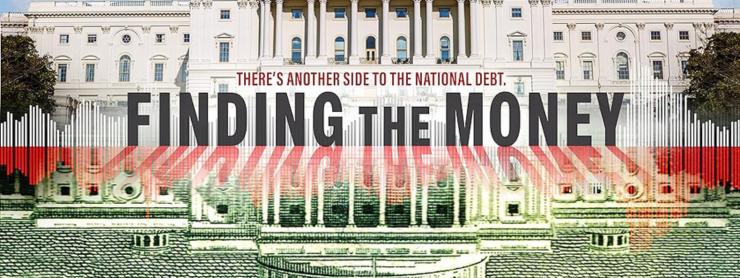
A (belated) Look at Finding the Money
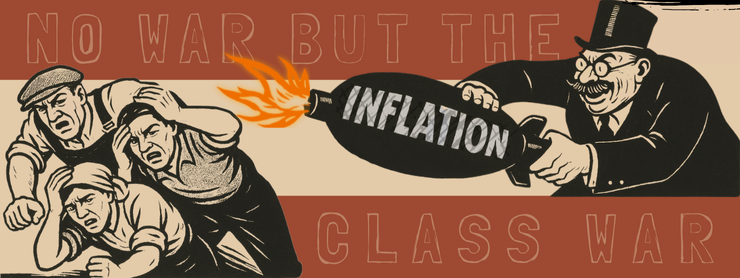
Inflation as a Weapon of Class Power: A Modern Monetary and Marxist-Leninist Perspective


